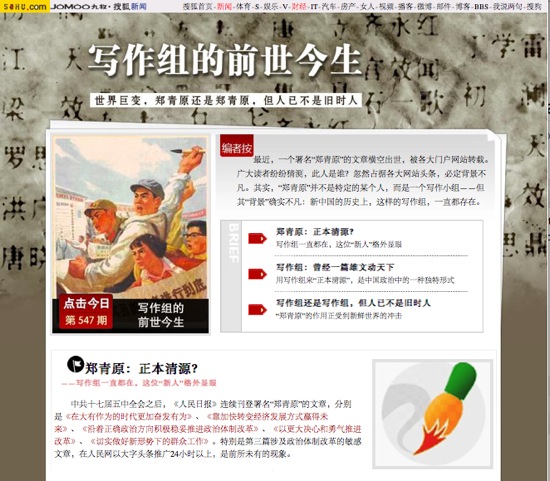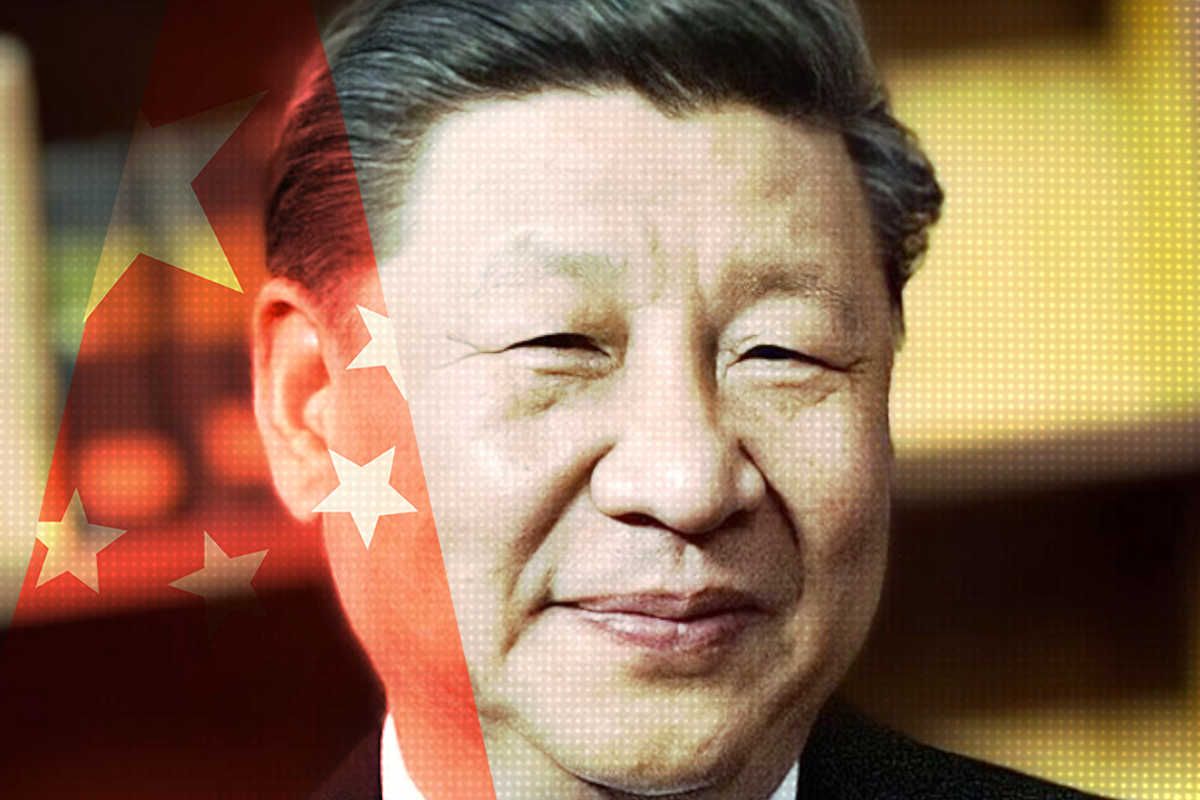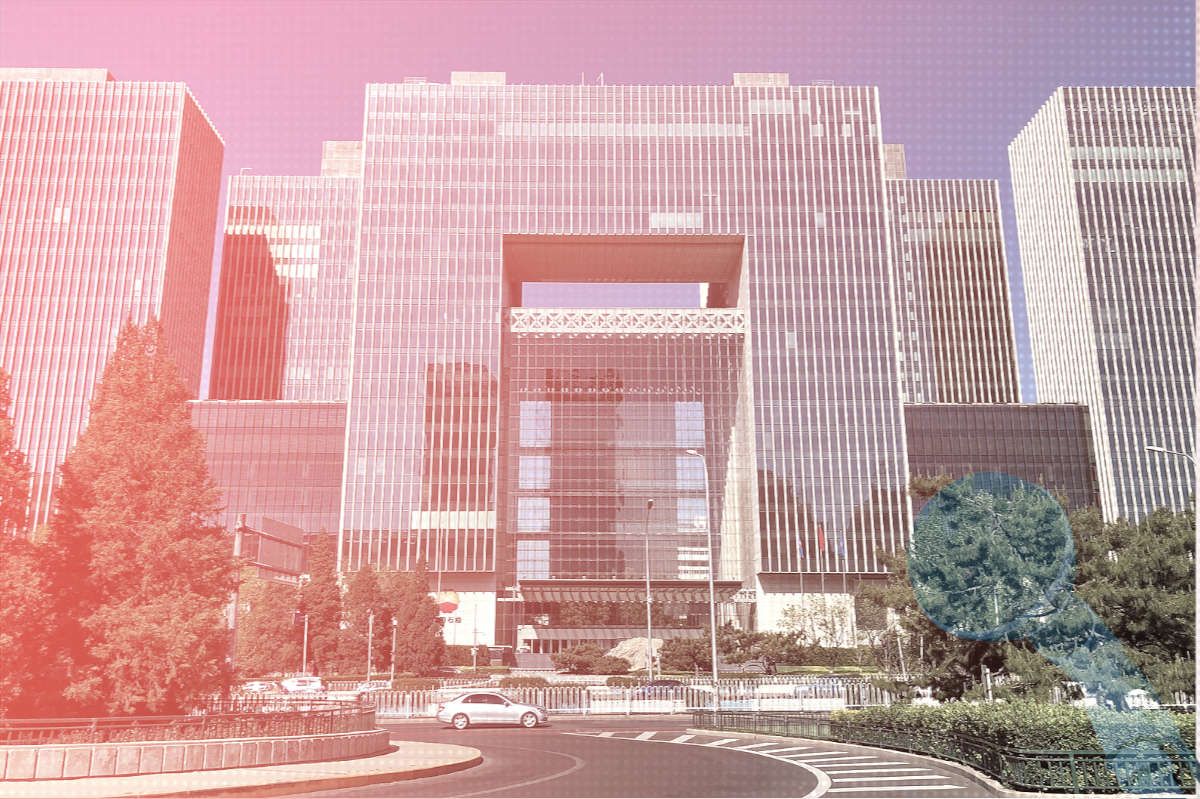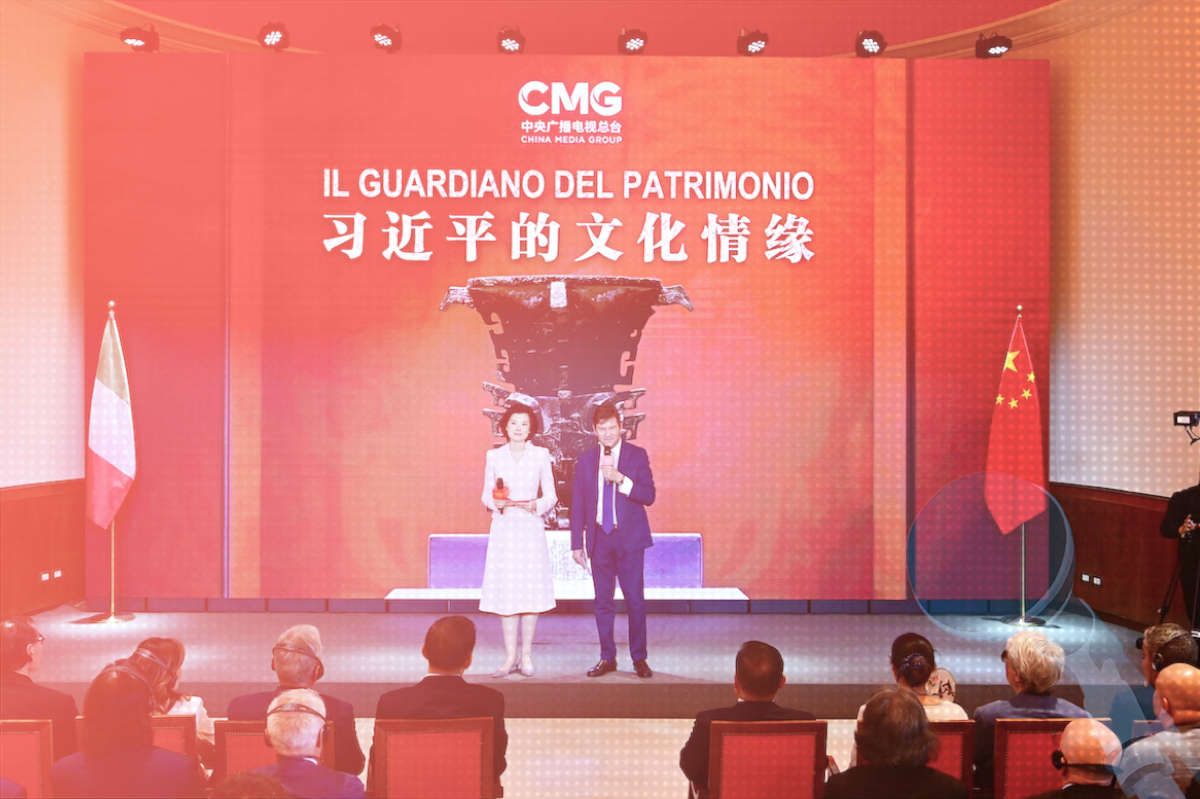CMP reported earlier this week about a bold feature page at Sohu.com, one of China’s top internet news portals, that took a not-so-subtle jab at a heavyweight series of official Party editorials appearing recently in People’s Daily under the mysterious assumed name “Zheng Qingyuan” (郑青原). Topping the Sohu page, which was quickly “harmonized” but can be downloaded in PDF form here (Sohu Missing Page 11.2), was an unmistakable visual reference to the disquieted era of the Cultural Revolution, when ideological rancor tore the country apart.

The Sohu feature page dealt with so-called “writing task groups”, or xiezuo xiaozu (写作小组) — referring to teams of editorial writers generating pieces to articulate the voices and viewpoints of specific political interests within the Communist Party — as a unique feature of China’s political environment and history.
Here is the “Editor’s Note” accompanying the feature page:
Lately, a series of articles under the assumed name “Zheng Qingyuan” have sailed into the world, and have been re-posted by major internet portals. Masses of [Chinese] readers have speculated as to who this person is? So suddenly commanding banner positions at major sites, this must be [someone] of no ordinary background. Actually, “Zheng Qingyuan” is not any specific person, but rather is [the name given to] a writing task group. But its “background” is out of the ordinary indeed. In the history of New China [since 1949], these writing task groups have existed all along.
A couple of subsections on the feature page linked to the same Beijing Morning Post article, called “Who is People’s Daily’s ‘Zheng Qingyuan’?” The Sohu page originally containing the article was expunged along with the feature page itself, but is still available elsewhere.
We have a (more or less) full translation of the Beijing Morning Post piece below.
Further down the feature page, Sohu provided a convenient table revealing a number of important “writing task groups” and the specific political interests behind them. The assumed name “Tang Xiaowen” (唐晓文), for example, is used for editorials from the Central Party School. The assumed name Ding Xuelei (丁学雷) is used for the Shanghai Party Committee, representing the city’s top Party leaders. Readers can see the full (unfortunately brief) list by clicking on the link to the feature page PDF at the top of this post.
“Who is People’s Daily’s ‘Zheng Qingyuan’?” [original link, now “missing”]
Beijing Morning Post
November 2, 2010
Readers who read the People’s Daily and People’s Daily Online will know that commentaries at the newspaper and website have a pre-eminent place among central Party media. In the past, aside from essays from a number of well-known commentary writers, there have been other bylines, like “Ren Zhongping” (任仲平) and Zhong Zuwen (仲祖文) with unique backing. Ren Zhongping is byline referring to group commentaries by People’s Daily, and a series of influential commentaries on the occasion of the PRC’s 60th anniversary were written under the name “Ren Zhongping,” a writer who is expert at commenting on major affairs, but who is really a group of handsome guys and pretty girls at People’s Daily. These sorts of commentaries have not only tight logic, but are written with literary grace as well, and they are generally well received by readers.
Another name often seen at People’s Daily is “Zhong Zuwen,” who we understand is a name given to commentaries written in the name of the Organizational Department of the CCP Central Committee. So if there is expounding on principles that touch on issues of ideological building (思想建设) or organization building (组织建设) within the Party, these come under the name “Zhong Zuwen.” For example, the study and practice of the scientific view of development (科学发展观), creating excellence (创优争先), and important language about various important movements in the past, are all expounded under the name “Zhong Zuwen.” There is no specific writer behind the name, and the focus is on the importance of the essay, the depth of its thought, and on how its views serve to direct . . .
Plainly, among these two bylines, the political status of the latter is greater than that of the former. While the former (“Ren Zhongping”) is after all the voice of the editorial department at People’s Daily, commentaries from the latter must go through the approval of the Organizational Department.
Following the [recent] Fifth Plenary Conference of the 17th Central Committee, an article under the name “Zheng Qingyuan” (郑青原) appeared to the world at People’s Daily and People’s Daily Online. This is an entirely new name that has never before appeared, and People’s Daily and People’s Daily Online have run three consecutive pieces under this name, including “To Promote Reform With Greater Resolve and Courage,” “Strive for a Brighter Future” and “Moving in a Correct Direction to Reliably Advance Political Reform“. Each article was weightier than the last, particularly the third, an essay that dealt with the sensitive issue of political reform and which was posted to the very top of People’s Daily Online for 24 hours, something itself unprecedented. All of this points to the importance of these pieces under the name “Zheng Qingyuan,” and implies that this “Zheng Qingyuan” is no ordinary writer [or set of writers], something that has piqued the curiosity of readers.
The piece, “Moving in a Correct Direction to Reliably Advance Political Reform” was released after the official bulletin on the resolutions of the Fifth Plenary Conference of the 17th Central Committee, and in an atmosphere in which the high expectations of some people ahead of the conference that there would be [actions on] political system reforms were disappointed. The article was brief and concise, offering a full description and clarification of the major question of political system reforms in our country. The article stated clearly that “the question of what kind of political system [a nation] employs, and what path of political development it takes, is something determined by the will of that country’s masses, and by the specific national circumstances, history and culture of that nation. Looking back on 30 years of opening and reform in our country, [the article said], it was clear that political system reforms had never ceased, that [reforms] had been promoted steadily while keeping to a correct political direction, and that the results obtained had been impressive; [the essay] struck back against a number of overseas media that had criticized our country for “lagging seriously behind on political reforms,” and once again raised Deng Xiaoping’s three standards by which to measure political reform . . .
The raising and emphasizing of these major viewpoints is clearly not something a single individual alone would have the ability to accomplish. Moreover, the conspicuous placement of these articles in People’s Daily and People’s Daily Online suggests that these are articles meant to explain and publicize the spirit of the Fifth Plenary Conference of the 17th Central Committee, and that they set the direction on the issue of political system reforms in the near term. They serve as bugle calls to set the tone, and they are of no ordinary political significance. For the outside world, and for people’s understanding of political reform, they serve to clarify matters and get to the bottom of things (正本清源). Therefore, internet users [in China] have, according to the past tendencies of People’s Daily [in selecting special bylines of this sort], taken [the name] “Zheng Qingyuan” to mean “clarifying matters and getting to the bottom of things. It is understandable that they have drawn wide interest.
However, analyzing the content of the above-mentioned articles, it seems to me that this understanding [of the significance of the pen name] is a more superficial understanding. I think [the name] represents a much higher-level personality or concord, and we can only understand this series of articles from “Zheng Qingyuan” as the public opinion guidance (舆论导向) [emerging from] the level of the politburo. These are the views emerging from the Political Bureau of the Central Committee of the CCP, a masterwork making clear the shared will and ideology undertaken by the whole Party, given an assumed name as befits media practice and other considerations and needs.





















